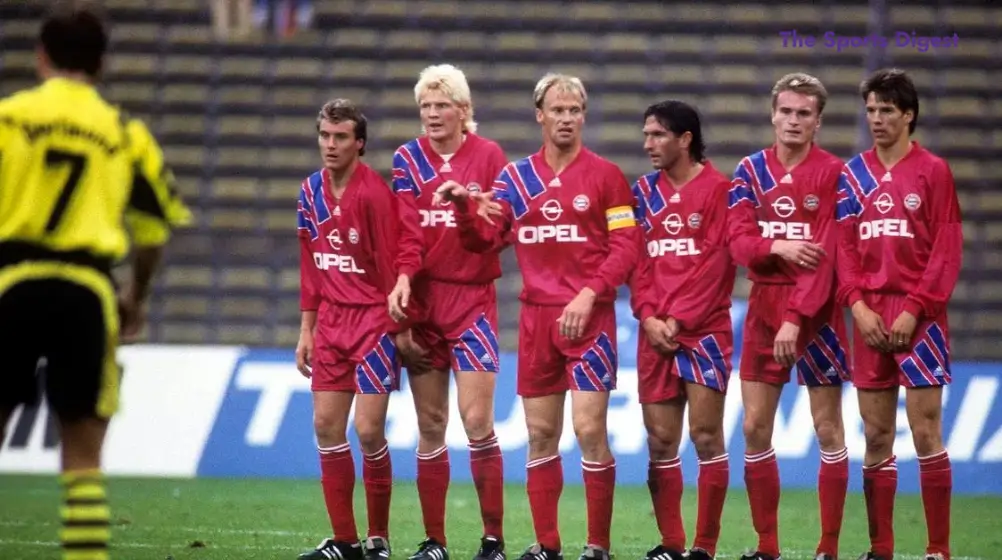Bayern Munich: The 1991/92 Collapse
Few football clubs command respect like Bayern Munich. The Bavarian giants have cemented their place as German football’s teutonic powerhouse, collecting 31 Bundesliga titles and 6 European Cups along their illustrious journey. From Franz Beckenbauer’s elegant sweeping to Gerd Müller’s clinical finishing, Bayern’s history reads like a who’s who of football royalty.
For most clubs, a trophyless season represents disappointment. For Bayern, it borders on crisis. Yet even the mightiest empires experience periods of decline, and in 1991/92, Bayern Munich suffered what remains their most catastrophic campaign in modern history – a season so dismal it still sends shivers through the Allianz Arena three decades later.
Table of Contents
Bayern Munich: The Calm Before the Storm
To appreciate the magnitude of this collapse, we must first understand that it arrived without warning. Under Udo Lattek’s guidance, Bayern Munich had reasserted their domestic dominance in the mid-1980s. When Jupp Heynckes took the reins in 1987, the transition appeared seamless, culminating in the 1988/89 Bundesliga title.
The 1989/90 season showcased Bayern Munich at their imperious best. Without relying on superstar names, they secured another league crown and reached the European Cup semi-finals. The red machine marched forward with characteristic German efficiency, their supremacy seemingly unassailable.
Seeds of Discontent
Summer 1990 brought fresh optimism with the arrival of Stefan Effenberg, whose confident proclamations matched his considerable talent. “We’ll win everything,” he declared, setting expectations stratospherically high.
The 1990/91 campaign offered the first subtle hints that all might not be well. A gripping title race with Kaiserslautern ended in heartbreak when a shocking late-season defeat to unfancied Wattenscheid ultimately cost Bayern Munich the championship.
European aspirations similarly crumbled in agonizing fashion. After battling to the European Cup semi-finals for a second consecutive year, Bayern suffered perhaps the cruelest blow when captain Klaus Augenthaler’s freak own goal handed Red Star Belgrade passage to the final. The season concluded with Bayern Munich uncomfortably empty-handed.
The Unraveling Begins
As the 1991/92 season dawned, few predicted impending disaster. Despite Augenthaler’s retirement, optimism surrounded new signings like Brazilian Mazinho. However, warning signs appeared immediately – a draw against Werder Bremen followed by a shocking defeat to newly-promoted Hansa Rostock. A narrow, unconvincing victory against Düsseldorf provided temporary relief before the true nightmare unfolded.
Cup Catastrophe
October 1991 delivered the first truly seismic shock. Facing second-tier FC Homburg in the DFB-Pokal first round, Bayern initially seemed on course when Mazinho fired them ahead. What followed was unthinkable.
Homburg, a modest club from Saarland, not only equalized but comprehensively outplayed their illustrious opponents. After 90 minutes at 2-2, extra time became a horror show for the Bavarians, with Homburg scoring twice more to secure a scarcely believable 4-2 victory. The sparse Olympiastadion crowd witnessed history – Bayern eliminated at the first hurdle by lower-league opposition.
European Embarrassment
If domestic disappointment wasn’t enough, European competition provided further humiliation. Drawn against part-time Irish side Cork City in the UEFA Cup first round, Bayern managed only a 1-1 draw in Ireland. Effenberg compounded matters by dismissively commenting on Cork’s Dave Barry, providing bulletinboard material for the underdogs.
The return leg in Munich proved equally troubling. Only a late goal and a controversial penalty secured a narrow aggregate victory, hardly the performance expected from a continental powerhouse. The warning signs were flashing brightly – something was most definitely not well in Bavaria.
Managerial Merry-Go-Round
League form continued to deteriorate, culminating in a 4-1 thrashing by Stuttgarter Kickers. This proved terminal for Heynckes, who was unceremoniously dismissed – a decision club president Uli Hoeness would later admit regretting.
The replacement raised eyebrows across Europe. Søren Lerby, a former Bayern player with absolutely no coaching experience (and lacking even the required coaching license), was handed the poisoned chalice. It was like appointing an apprentice to perform brain surgery.
The Nadir: Danish Dynamite
Under Lerby’s bewildered guidance, Bayern plumbed new depths in the UEFA Cup second round against Danish minnows Boldklubben 1903. After taking an early lead in Copenhagen, Bayern’s defense imploded spectacularly, conceding five unanswered goals – including three in a devastating seven-minute spell.
The final 6-2 scoreline represented Bayern’s heaviest European defeat in history. The hollow 1-0 victory in the return leg merely confirmed their humiliating exit. Europe’s elite could scarcely believe what they were witnessing.
Third Time Unlucky
Lerby’s 15-game reign inevitably ended in dismissal, with experienced Erich Ribbeck appointed as firefighter-in-chief. Even Ribbeck’s steady hand couldn’t arrest the slide, as Bayern limped to a scarcely believable 10th-place finish – their lowest Bundesliga position since 1978 – with a negative goal difference.
While VfB Stuttgart and Borussia Dortmund battled for glory, Bayern languished in mid-table mediocrity. For a club defined by excellence, this represented an existential crisis.
Rebuilding from Ruins
The 1992 summer witnessed wholesale changes. Lothar Matthäus returned from Italy, while underperformers like Brian Laudrup and Effenberg departed. The following season brought improvement under Ribbeck, though he eventually left without silverware – the first Bayern manager to serve over 500 days without winning a trophy.
Legacy of Failure
The 1991/92 season remains Bayern Munich’s modern nadir. While the “FC Hollywood” era of the 1990s brought further turbulence, nothing matched the perfect storm of that catastrophic campaign.
What makes this season so fascinating is its aberrational nature. Elite clubs occasionally endure difficult periods, but rarely do they collapse so spectacularly without warning. For supporters of clubs vanquished by Bayern in subsequent decades, this season remains a cherished anomaly – proof that even football’s most ruthless winning machine can temporarily malfunction.
For Bayern themselves, it served as a brutal reminder that dominance is never guaranteed. Perhaps this lesson explains their relentless pursuit of excellence ever since – determined never again to experience a season quite like the nightmare of 1991/92.
Have you ever read an article like this?
There are no reviews yet. Be the first one to write one.






